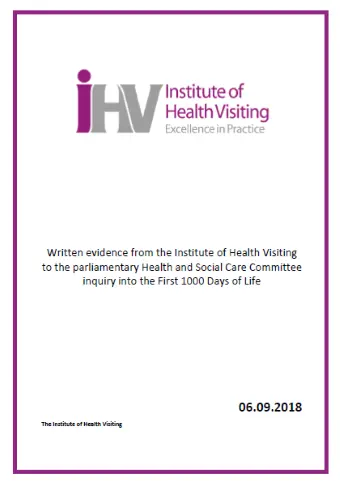25th October 2018
The Institute of Health Visiting (iHV) has published its written evidence submitted to the parliamentary Health and Social Care Committee inquiry into the First 1000 Days of Life.
The bulk of public spending during a child’s life comes in their teenage years, but there is a significant case for investing public money much earlier – i.e. during a child’s first 1000 days of life. There is strong evidence showing spending then has many later benefits to individuals and society – the problem is the gap between that evidence and what is currently provided. This inquiry is to review that gap.
Dr Cheryll Adams CBE, Executive Director, Institute of Health Visiting said:
“We welcome this inquiry into the First 1000 day of a child’s life. Evidence supports a specific priority for focusing spending on early intervention, prevention and inequalities as they affect children in the first 1000 days of life. We know that this would have a significant impact on their future health and development across the life-course. Investing more resources in the first 1000 days, would lead to less investment being needed for secondary and tertiary care in later life, by preventing problems (and increased costs of later healthcare) from occurring in the first place.
“Health visitors have highly developed skills in assessment and the formation of trusting relationships with families, each being critical to effective engagement with families in the first 1000 days. Adequate resourcing of the service could be delivering enhanced and earlier support to prevent problems or reduce their impact and in so doing reduce later expenditure for the NHS.”
The parliamentary Health and Social Care Committee inquiry into the First 1000 Days of Life is not re-examining the evidence base, or the economic case. Instead it plans to focus on the following three key areas: national strategy, current spending and barriers to investment and local provision.
Dr Adams continued:
“On national strategy, we propose that the NHS should act with others to strengthen the governance of the Healthy Child Programme (HCP) across all partners. This should be through joint integrated NHS and local authority commissioning within a national quality framework for systems-based practice for child and family public health. That should realise the benefits of closer working both with NHS child health services and primary care, alongside local authority services such as children’s centres. In such a context, health visitors are well equipped to more realistically fulfil their long-recognised mandate to both deliver in practice and to lead the HCP at system level.
“On current spending and barriers to investment, we highlight the impact of recent reductions in public health funding and evidence of the impact of reductions in the resourcing of health visiting. We also recommend that health visitor caseload size should not exceed 250 children per full time health visitor or a maximum ratio of 1:100 in more deprived areas.
“Our written evidence submission lays out what the Institute believes a high-quality evidence-based approach to service provision would look like for the First 1000 Days of life if more spending happened during this period. Health visitors, with their highly developed skills, are well placed and critical to supporting this agenda.”



